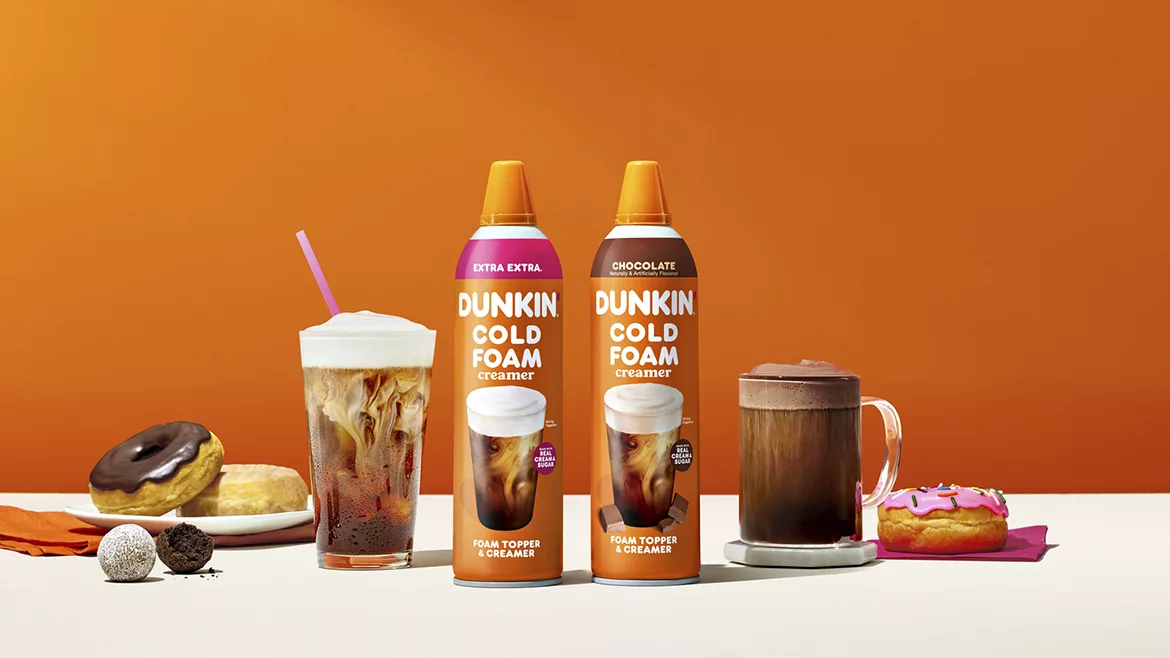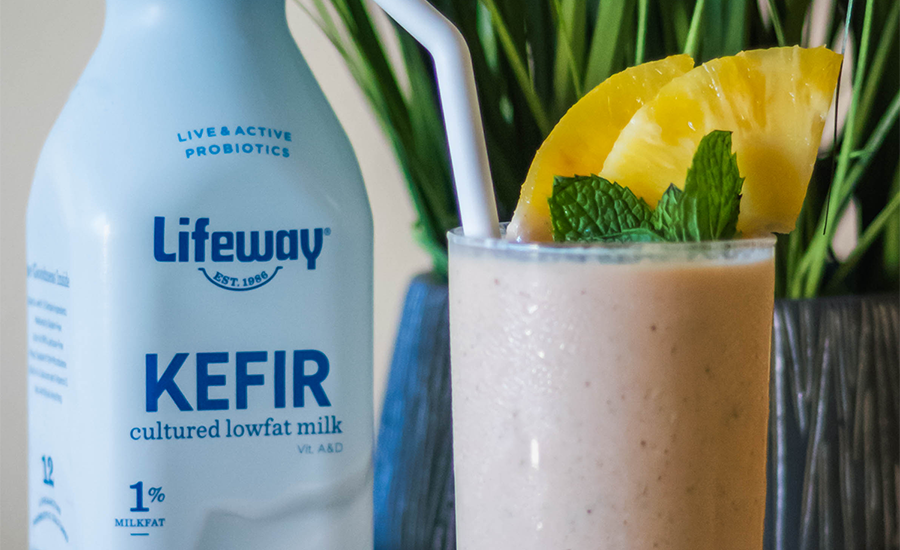Creamers, dairy drinks segments pivots to meet consumer needs
Functionality, plant-based creamer and dairy drink options among priorities for consumers

Image courtesy of Dunkin’
In the first “High School Musical” movie, Sharpay Evans is distraught when she discovers that jocks and nerds are infiltrating her precious theater club. She is especially upset because her longtime crush, Troy Bolton, is considering singing in the winter musical with new girl, Gabriella Montez. During lunchtime, the school breaks out into the song, “Stick to the Status Quo,” which is all about sticking to the stuff you know and not messing with the flow of things in school.
Despite no singing involved, the beverage industry has seen things shake up the status quo within the creamers and dairy drinks segment.
John Rodwan, editorial director at Wintersville, Ohio-based Beverage Marketing Corporation (BMC), shares that creamers have “enjoyed strong growth in recent years.” Volume for the segment is growing at high single-digit rates and retail dollars are growing at rates in the low double digits, he adds.
Olivia Sanchez, senior vice president of creamers at Danone North America, Denver, says the company has a pulse on consumer insights and trends.
“We’ve seen the tide turning toward a desire for more creamer variety — both dairy and plant-based — for years now and have been actively innovating a steady flow of delicious flavors, formats and new partnerships, year over year, to keep up with consumers’ cravings and wants — and it’s working.”
Danone’s coffee creamer portfolio includes International Delight, Dunkin’ and Silk. Sanchez says the category continues to see steady growth, especially as the company hones in on reaching the next generation of coffee drinkers: Generation Z. She adds that Gen Z appreciates variety, fun flavors and coffeehouse experiences they can appreciate at home.
“Both seasonal coffees and creamers garner interest from around 40% of consumers, making it the No. 1 interest in innovation,” she explains. “To that point, it’s not surprising that in Q3 2024, a key time for our fall seasonal portfolio, our coffee and creamer category delivered sustained double-digit growth led by STōK Cold Brew and International Delight ― two of our most innovative brands.”
Mitch Madoff, head of retail partnerships at Keychain, New York, says that the creamer category has experienced steady growth over the past year, fueled by changing consumer preferences, social media trends and innovation.
“Influencer-driven content and viral recipes have sparked interest in both classic creamer options and plant-based ones, like oat and almond,” he states. “At the same time, private label offerings have gained traction for their affordability and quality, especially among younger shoppers. Creamers with unique and fun flavor options are on the rise as people seek ways to personalize their daily coffee and tea drinks and add a touch of indulgence to their day.”
Functional creamers with added benefits such as collagen or adaptogens also are gaining popularity, Madoff shares, which reflects the growing focus on health and wellness.
Seeing success
Julie Smolyansky, CEO of Lifeway Foods Inc., Morton Grove, Ill., says that cultured dairy products like Lifeway Kefir are top-of-mind for consumers. Such products have seen exponential growth in the past year thanks to continued interest in gut health and immune system support, she explains.
“We’ve also seen large growth in the high-quality protein dairy drink segments,” Smolyansky adds. “Products like Lifeway Kefir have gained more traction in the space due to the importance of bioavailable protein choices that ride along with probiotics found in our cultured dairy drinks.”
Victoria Badiola, vice president of Greek and functional nutrition at Danone North America, says that the company is designing the food benefits of the future.
“We have decades of nutrition sciences leadership and are on the frontlines of many innovative, health-driven food spaces, including our dairy drinks portfolio,” Badiola notes.
Three trends, she notes, are driving consumer interest for this category:
- Consumer demand for high protein.
- Growing consumer interest in gut health and its contribution to consumers’ overall health benefits.
- Desire for low- to no-sugar products with consumers looking to reduce sugar in their overall diet.
Several dairy drink segments are seeing significant success, according to Keychain’s Madoff. Their success is driven by shifting consumer preferences toward health, convenience and sustainability, he notes.

“Keychain data shows that functional dairy drinks, like protein-enriched milk and probiotic-rich beverages, have experienced strong growth, with brands like Fairlife and Siggi’s leading the charge, offering products that not only support gut health, but also provide additional nutritional benefits,” he explains.
Madoff adds that specialty milks, like organic and grass-fed varieties, have become increasingly popular as well — their rise in popularity can be attributed to consumers’ prioritization of premium, ethically sourced products.
Honing in on health and wellness
Like many beverage categories, health and wellness is having a greater impact on innovations. Lifeway’s Smolyansky feels that health and wellness trends are having a major impact on consumer interest in dairy drinks. These benefits are the top priority of many people when choosing dairy drinks, she adds, especially in the cultured dairy space.
“We’re all looking for more benefits in single product choices, and Lifeway is happy to offer the best options found in our kefir that provides customers with probiotics, protein and immune/gut support all in one,” Smolyansky says. “Health and wellness interests in dairy drinks have really only just begun, and we know 2025 is going to be a huge year of growth for products like our kefir in this space.”
Similarly, Danone’s Sanchez notes that health and wellness trends are important to consumers now more than ever.
“We especially see plant-based consumers looking for healthier and more natural offerings, gravitating toward plant-based creamers,” she says. “While some consumers are making a full switch from dairy to plant-based, we also see room for both in the fridge, which is a ‘flexitarian’ approach using both dairy and plant-based, depending on the day or desire in the moment.
“We have also seen an increased [interest] in flavor, personalization and bringing the coffeehouse experience home, which has opened the floodgates for more creative flex in the creamer space,” Sanchez continues.
Danone’s Silk brand, which Sanchez considers a pioneer in the plant-based creamer category, gives plant-based consumers the best of both worlds: a dairy-free creamer that’s creamier, full of flavor and offers variety.
“We meet a range of plant-based needs across oat, almond and soymilk products, including our newest Zero Sugar Vanilla Cinnamon Oat Creamer catering to those looking for less sugar, and our new line of Silk Oat Cold Foam Creamer, which foams and creams hot or cold coffee, for sippable foam in seconds,” Sanchez adds.
International Delight also features a line of Zero Sugar creamers in both its core and holiday offerings. Consumers looking for an indulgent balance can enjoy the traditional creamers and Cold Foam Creamer from Dunkin’, Sanchez shares.
“As it relates to dairy drinks, consumer expectations for nutrition are rapidly growing with health through food and becoming more critical than ever,” Danone’s Badiola says.

She again mentions the three macro trends that are driving growth in the category, all relating to consumer health and wellness. Badiola emphasizes consumer desire for protein and the prevalence of glucagon-like peptide-1 (GLP-1) medications.
“We also understand that convenience, like drinkable yogurts that offer these functional consumer benefits, is in high demand,” Badiola notes. “Danone is pairing the rise in consumer demand for functional benefits with formats that fit different lifestyles across our portfolio, as seen in Oikos, Too Good & Co. and Activia.”
Rise of plant-based solutions
Danone’s Sanchez shares that the company’s portfolio provides something for everyone, whether dairy or plant-based. This has allowed the company to flex and adapt with current trends, including the rise of plant-based solutions.
“We’ve seen that plant-based consumers are not always treated equal at coffeehouses — either places upcharge for a plant-based creamer (or milk), or they are limited in great-tasting plant-based flavors and options, such as cold foam,” Sanchez states. “Silk is seeking to change that by making a delicious plant-based coffeehouse experience more accessible — right at home, by bringing an oat-based Cold Foam Creamer to market and introducing more in this category from Zero Sugar to a variety of flavors.”
Silk’s portfolio of plant-based creamer alternatives includes its new Cold Foam Creamers in Cinnamon Caramel Oat and White Chocolate Macadamia Oat.
Additionally, with more people managing allergies and dietary restrictions, Keychain’s Madoff notes that demand for allergen-friendly products is on the rise.
“Plant-based varieties often check the allergen-free box, making them a go-to choice for many consumers,” he says. “The rise of plant-based alternatives in the creamer category has kept the market both relevant and aligned with current trends and consumer preferences. Creamers made from ingredients like oat, almond and coconut have gained widespread popularity, with Keychain showing brands like Oatly, MALK and Tache as leaders, offering creamy, flavorful solutions for those seeking dairy-free options.”
Madoff adds that this shift has forced traditional dairy brands to innovate and meet the growing demand for dairy-free options. He says the rise of plant-based and allergen-friendly options emphasizes traction toward better-for-you (BFY) alternatives and creates products for a more mindful, health-conscious audience.
The rise of plant-based alternatives in the creamer category has kept the market both relevant and aligned with current trends and consumer preferences.
“The plant-based movement continues to reshape consumer expectations, driving innovation and expanding the possibilities in the creamer,” he notes.
Leaning into trends
High-quality protein is another rapidly growing trend in the space, Lifeway’s Smolyansky shares. She says the trend is driven by increasing interest in dairy-based protein drinks due to their nutrient-rich profile.
“Dairy offers one of the best quality protein options out there, and kefir has even more benefits due to its ease of digestion and mood/mind supportive benefits,” Smolyansky explains. “Muscle health, quality protein options and easy to digest sources of protein are going to continue to be top of interest this year as people everywhere are looking to take in the best protein sources that are also good for their gut health.”
Natural products with trending and flavorful ingredients, like Lifeway’s latest Flavor Fusions Kefir options featuring unique flavor choices, are other areas where Smolyansky has noticed an increased interest.
In terms of consumers eager to explore these trends, Danone’s Sanchez shares that Gen Z and millennial coffee drinkers are 50% more likely to make coffeehouse-inspired drinks at home, and much of their inspiration comes from TikTok and other social media platforms.
“More than 70% of Gen Z consumers also use more creamer than previous generations and they want to explore and try new flavors,” she says. “Danone, with our fantastic portfolio of brands like International Delight, Silk and Dunkin’, can meet our consumers where they’re at.”
Laura Shenkar, founder and CEO of pecan milk brand PKN, Austin, Texas, notes there has been an increased demand in vegan diets and environmental awareness. The brand recently launched PKN JOY Barista, a frothable pecan milk.
“We’re also seeing that most of the people choosing plant-based creamers are not lactose intolerant, so we see a rise in consciousness toward dietary restrictions, natural sources of sweetness, a pull away from artificial sweeteners and pull toward new flavors,” Shenkar says.
Looking ahead
Lifeway’s Smolyansky anticipates the road ahead is exciting. This year, she expects to see growth in the dairy category.
“The cultured dairy drink space has taken off rapidly over the last several years, but we know it’s just the tip of the iceberg,” she says. “It’s already a unique space that has so much potential for innovation and experimentation in healthier choices for consumers, with new and evolving ingredients, which is what we have continued to offer year after year.”
Whether it is Lifeway’s ProBugs pouches for kids or its artisan-made Farmer Cheese that is a healthier alternative to cottage cheese, Smolyansky feels that the company is a leader in the space of innovation and listening to what consumers want without sacrificing the quality of the ingredients used by the brand.
“We know the space is going to perform even better this year as social media continues to be a source of daily inspiration and information for consumers looking to better their health, and we want to provide them with everything they’re looking for and more in the cultured dairy drink space,” she says. “We have so many incredible options for the year ahead that will help them stay nourished and inspired at the same time.”
Danone’s Sanchez expresses that at-home coffee consumption and the rise of personalization are here to stay.
“Consumers continue to crave products across a coffee continuum for different occasions and needs, whether that’s plant-based creamers for the day-to-day or a seasonal LTO (limited time offering) for a nostalgia-driven holiday treat,” she says.
The company has seen great success with pop culture entertainment partnerships from International Delight, which have historically been some of the most popular, Sanchez adds.
“International Delight x FRIENDS LTO in 2023 became our best-selling LTO SKU, only to be overthrown by our International Delight x Bridgerton LTO flavors in 2024,” she says. “We are looking forward to seeing how the excitement and popularity of Love is Blind performs next, which we hope performs on track with the trajectory we’ve seen year over year.”
In 2025, Sanchez anticipates to see growth in both traditional creamers and dairy drinks as well as plant-based creamers and drinks.
Keychain’s Madoff expects that the creamer and dairy drink markets will continue to thrive in the year to come, because many trends aren’t going anywhere. Private label creamers will continue gaining traction as consumers seek premium taste at better prices, while Gen Z’s growing preference for non-dairy options will keep alternative creamers and milk in demand, he shares.
“We’ll also see many brands that haven’t yet hopped on the plant-based trend to follow suit this year,” Madoff says. “Health trends are steering both categories, with clean labels, added protein and functional benefits like probiotics leading the way. As consumer demand for both indulgent and health-conscious choices continues to soar, the market will likely see new drink innovations that cater to a broader range of tastes and dietary preferences emerge.”
Looking for a reprint of this article?
From high-res PDFs to custom plaques, order your copy today!






-1170x658.webp?height=200&t=1771430092&width=200)